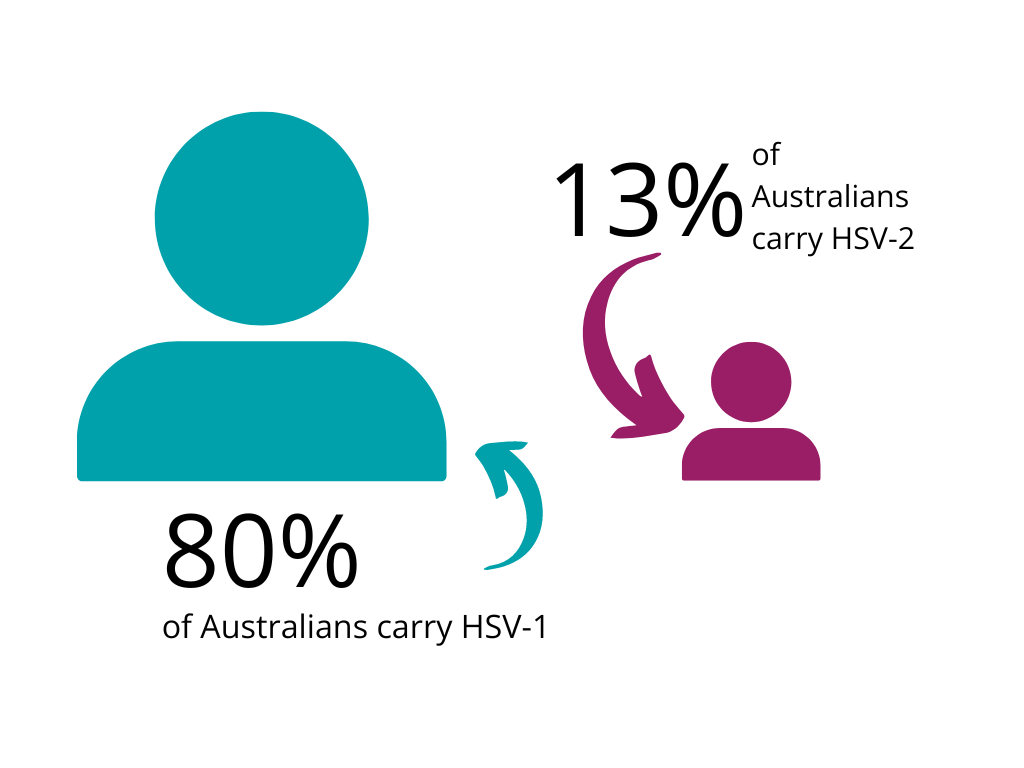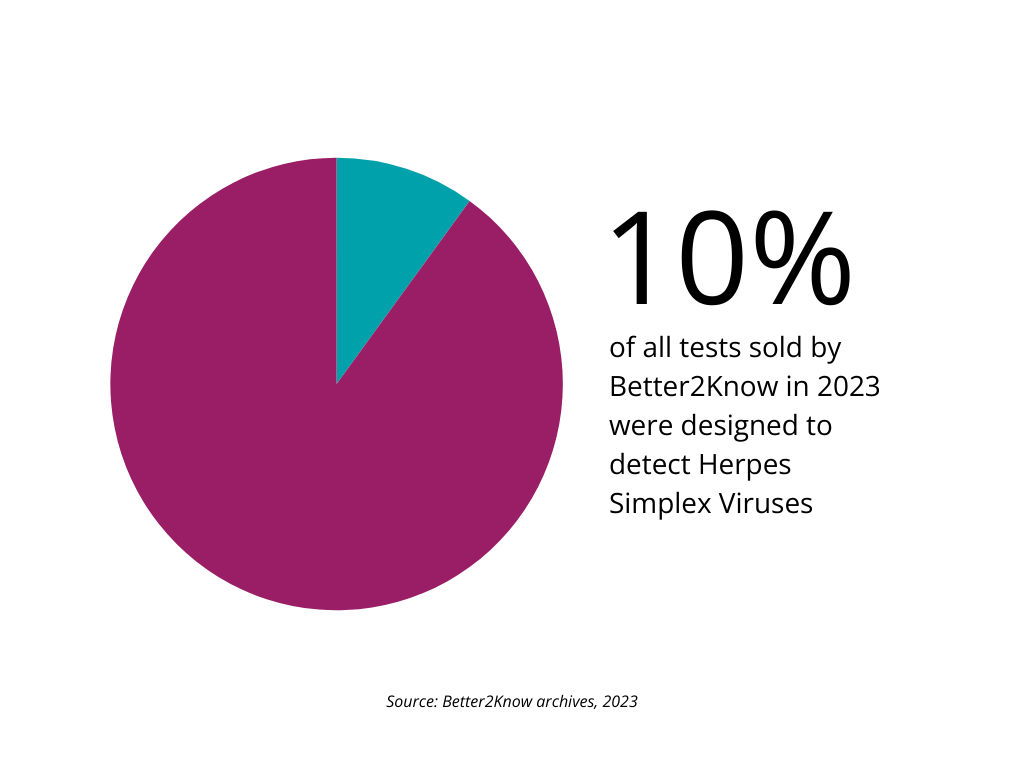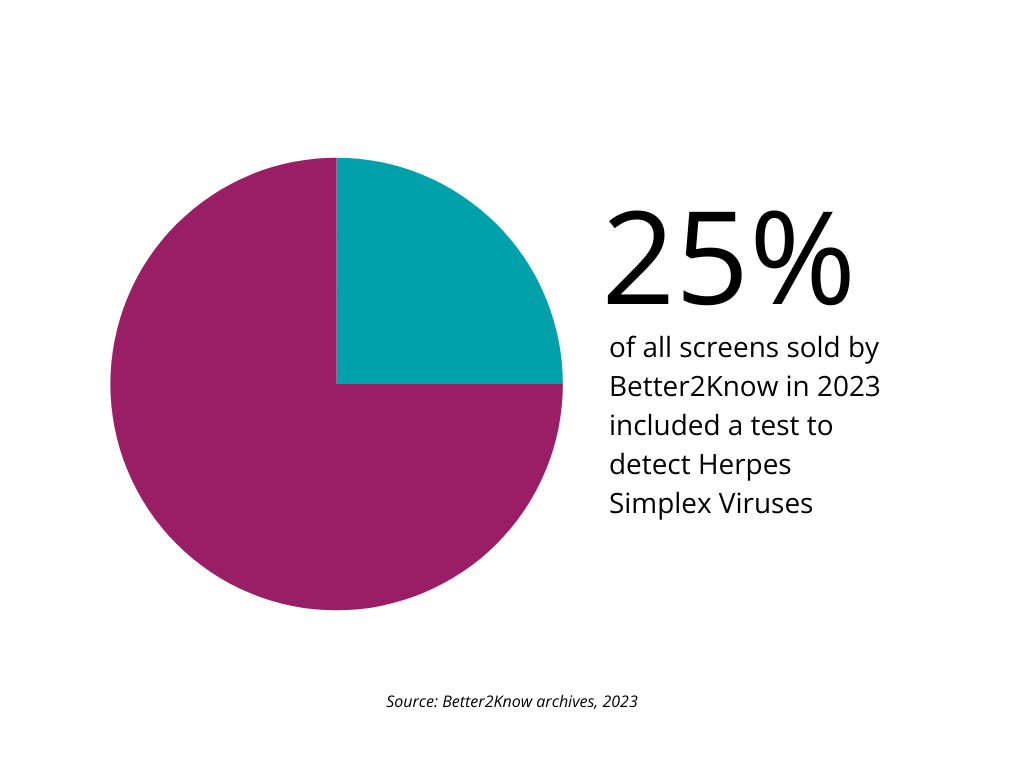What’s worse than a headache? Getting a headache that may be caused by an STI.
Many STIs can cause headaches, and Herpes is one of the most common of these infections.
If you’ve been experiencing severe headaches and you’re wondering if they could be related to Herpes, this blog post is for you. We’ll explain what a Herpes headache is, what it feels like, and what you should do if you think you’re experiencing one.
What is Herpes?
Herpes can be caused by two different but closely related viruses: Herpes Simplex Virus Type 1 (HSV-1) and Herpes Simplex Virus Type 2 (HSV-2). HSV-1 primarily causes Oral Herpes, leading to cold sores around the mouth, while HSV-2 is the main cause of Genital Herpes, which can cause blisters around the genitals and anus. These blisters may burst during the outbreak, forming sores that can ooze and weep.
In both instances, infected people may experience certain symptoms before an outbreak of blisters.
The symptoms of an Oral Herpes outbreak may include itching, tingling, or pain around the mouth. The symptoms that precede a Genital Herpes outbreak can include flu-like symptoms such as fever, body aches, and swollen lymph nodes. People with a Genital Herpes infection may also experience some pain during urination.
These symptoms are far more likely to occur before the first outbreak and become less frequent over time as the body develops an immune response to the virus.
Herpes Simplex Virus infections are one of the most common STIs in Australia. It’s estimated that about 80% of adults carry the HSV-1 virus. Approximately 13% of adults carry HSV-2 and may experience Genital Herpes symptoms.

As a provider of sexual health testing services to Australians, Better2Know encounters many people who worry they may have a Herpes infection.
Of all the tests that Better2Know provides, around 10% are tests specifically designed to detect a Herpes infection.

Further, 25% of all the screens sold by Better2Know in 2023 included a test for Herpes.

What is a Herpes headache?
A Herpes headache, which can be part of a cluster of symptoms known as a “Herpes prodrome” can occur before or during a Herpes outbreak. It’s considered one of the early warning signs that an outbreak may be imminent.
You can experience a headache if you have a Genital Herpes infection or an Oral Herpes infection.
Why does a Herpes infection cause a headache?
A Herpes headache can be a result of the immune response to a Herpes infection.
When the virus infects the body, it triggers an immune response. This response involves the release of signalling proteins called interferons, which recruit other protective molecules and block the virus from establishing infection.
In some cases, Herpes can lead to conditions like Herpes Meningitis, which is an inflammation of the protective tissue around the brain and spinal cord. This inflammation can also cause a persistent headache.
In addition, HSV can cause encephalitis, an inflammation of the brain accompanied by neurological dysfunction. Symptoms of encephalitis include headache, altered consciousness, seizures, focal dysfunction, papilledema, fever, myalgia, and respiratory or digestive symptoms.
What does a Herpes headache feel like?
Herpes headaches are often described as intense, throbbing, or migraine-like.
The pain of a Herpes headache can be debilitating and may interfere with daily activities. Some people report that the headache feels like a dull, constant ache, while others describe it as sharp, stabbing pains.
Does getting a Herpes headache mean I'm having an outbreak?
Not necessarily.
While a Herpes headache is often a precursor to an outbreak, it’s possible to experience a headache without developing any visible sores or blisters. Herpes headaches can occur during periods of viral shedding, even if there are no other noticeable symptoms.
This is more common in those who have had the virus for a longer period, as their bodies have had more time to build up immune responses to the Herpes virus infection.
What should I do if I have a Herpes headache?
What should I do if I have a Herpes headache?
If you suspect that you’re experiencing a Herpes headache, there are several steps you can take:
- Take over-the-counter pain medication: Non-steroidal anti-inflammatory drugs (NSAIDs) can help alleviate the pain and reduce inflammation.
- Apply a cold compress: Placing a cold pack or damp cloth on your forehead or the area where you feel pain can provide relief.
- Stay hydrated: Dehydration can worsen headaches, so make sure to drink plenty of water.
- Rest in a dark, quiet room: Sensitivity to light and sound is common with Herpes headaches, so resting in a dark, quiet environment can help.
- Consult a healthcare provider: If the headache is severe or accompanied by other concerning symptoms, it’s best to seek medical attention.
- Get tested: If you suspect your headache is related to Herpes but haven’t been tested before, it’s important to get an accurate diagnosis. Better2Know offers confidential STI testing services at clinics across Australia.
Final thoughts
Herpes headaches can be a painful and debilitating experience, but understanding the infection can help you manage the symptoms more effectively. If you’re experiencing severe or recurring headaches accompanied by other symptoms, it’s crucial to get tested.
Better2Know offers comprehensive STI testing services, including Herpes testing, at our sexual health clinics nationwide. Our friendly and professional staff will guide you through the testing process and provide you with accurate and reliable results.
Book your appointment today and take control of your sexual health.





